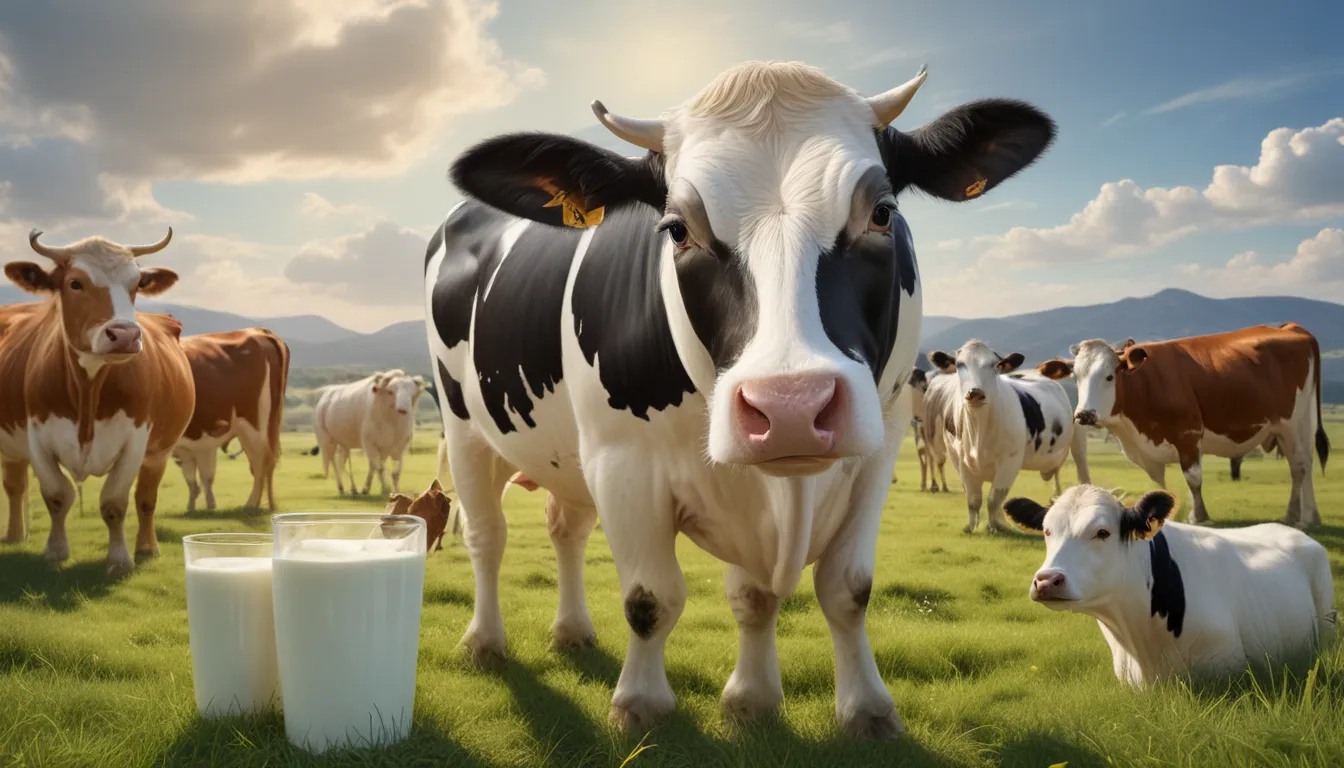The pictures we use in our articles might not show exactly what the words say. We choose these pictures to make you interested in reading more. The pictures work together with the words but don’t take their place. The words still tell you the important facts.
Dairy cows are not just ordinary animals; they are amazing creatures that play a vital role in providing us with delicious and nutritious dairy products that we enjoy every day. Beyond their milk production capabilities, dairy cows have some fascinating qualities and behaviors that make them truly remarkable. In this article, we will delve into 19 fun facts about dairy cows that will both surprise and delight you. From their unique digestive system to their social nature, there is so much to learn about these gentle giants. So, sit back, relax, and let's explore the fascinating world of dairy cows together!
The Amazing Digestive System of Dairy Cows
One of the most unique features of dairy cows is their four-compartment stomach, which sets them apart from humans and many other animals. This specialized digestive system consists of the rumen, reticulum, omasum, and abomasum, each playing a crucial role in the digestion process. Thanks to their complex digestive system, dairy cows can efficiently process their plant-based diet and extract maximum nutrients from their food.
Impressive Milk Production
Dairy cows are true milk-producing machines, with the ability to churn out an average of 6-7 gallons of milk per day. To fuel their impressive output, these hardworking animals can consume up to 100 pounds of food daily. Their dedication to providing us with dairy products is truly remarkable and highlights the importance of their role in our daily lives.
Social Creatures with Unique Characteristics
Dairy cows are not just milk producers; they are also social animals that form strong bonds within their herd. Through various vocalizations and body language, these gentle giants interact and communicate with each other, showcasing their social nature. Additionally, each dairy cow has a unique pattern of spots, much like our fingerprints, making them easily recognizable and adding to their individuality.
Lifespan and Size
The average lifespan of a dairy cow ranges from 5-7 years, with some cows living longer under optimal conditions. These animals can weigh around 1,400 pounds on average, with some exceptional individuals tipping the scales at over 2,000 pounds. Their impressive size and stature make them truly magnificent creatures to behold.
Behavior and Senses
Dairy cows exhibit fascinating behavior traits, such as spending an average of 6 hours a day eating to maintain their energy levels and high milk production. They also have excellent panoramic vision, allowing them to be aware of their surroundings and potential threats. Their keen sense of smell further enhances their ability to locate food and detect changes in their environment, showcasing their remarkable sensory capabilities.
Dairy Cow Breeds
Various dairy cow breeds exist, each with its own unique characteristics and milk production capabilities. Some of the popular dairy cow breeds include Holstein, Jersey, Guernsey, and Brown Swiss, each contributing to the diversity within the dairy farming industry. These distinct breeds play a vital role in meeting the diverse needs of consumers worldwide.
The Dairy Industry and its Significance
The dairy industry plays a crucial role in the economy, providing employment opportunities for thousands of people and contributing significantly to the agricultural sector in many countries. Dairy farming is not just about milk production; it is about sustaining livelihoods, supporting local economies, and ensuring a steady supply of dairy products for consumers worldwide.
Modern Dairy Farming Practices
In the modern era, dairy farming has evolved with the introduction of automated milking machines that streamline the milking process. These advanced technologies allow dairy cows to be milked at their convenience, ensuring their comfort and well-being. Additionally, providing access to clean and fresh water is essential for dairy cows, as they can drink up to 50 gallons of water per day to maintain their overall health and milk production.
Ethical Considerations in Dairy Farming
Ethical considerations are paramount in dairy farming, as the welfare of dairy cows is a top priority for farmers and consumers alike. Regular milking, proper nutrition, and humane treatment are essential practices that contribute to the well-being of dairy cows. By maintaining high standards of care and management, dairy farmers ensure that their cows thrive and continue to provide us with the dairy products we love.
Controversies and Debates in the Dairy Industry
The use of bovine somatotropin (BST) injections in dairy cows remains a topic of debate and controversy within the dairy industry. BST is a hormone used to increase milk production, but its impact on animal welfare and human health is contentious. As consumers become more conscious of ethical and sustainable practices, the dairy industry continues to evolve to meet changing demands and preferences.
Conclusion: Celebrating the World of Dairy Cows
In conclusion, dairy cows are not just animals; they are integral members of our society who provide us with valuable dairy products that nourish our bodies and bring joy to our lives. Their remarkable qualities, impressive milk production capabilities, and unique characteristics make them truly fascinating creatures to study and appreciate. As we raise a glass of milk or indulge in a dairy treat, let's take a moment to honor the hard work of dairy cows and the farmers who dedicate themselves to their care. Together, we can celebrate the amazing world of dairy cows and recognize the vital role they play in sustaining our way of life.
FAQs
-
How much milk can a dairy cow produce per day?
A dairy cow can produce anywhere from 6 to 7 gallons of milk per day, showcasing their impressive milk production capabilities. -
Do dairy cows have names?
Many dairy farmers give their cows names, fostering a closer bond between the animals and their caretakers. -
Are dairy cows always pregnant to produce milk?
Yes, dairy cows need to be impregnated in order to produce milk. The calving process triggers milk production, which continues until the cow is ready for another round of breeding. -
What is the lifespan of a dairy cow?
On average, dairy cows live for around 5-7 years, with proper care and management potentially extending their lifespan. -
How do dairy cows contribute to the economy?
Dairy cows play a significant role in the economy by providing employment opportunities, supporting local agriculture, and ensuring a stable supply of dairy products for consumers.
As we continue to explore and learn about the world of dairy cows, let's appreciate their contributions to agriculture, nutrition, and our daily lives. With a newfound understanding and respect for these remarkable animals, we can celebrate their role in shaping our world and sustaining our communities. Cheers to the wonderful world of dairy cows!






